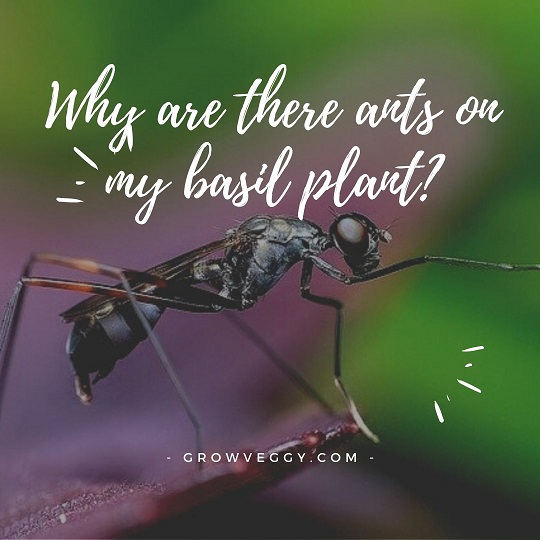Ants on any plant are never a good sight. They can multiply very quickly, which means that they can cover the whole plant in a very short time.
While ants are usually harmless to basil and do not feed on it, they can be a nuisance sometimes. Thus, It is important to know why and how ants infest a basil plant and if so, how to get rid of them.
Reasons why your basil plant has ants on it
1. Feeding on the secretion of other insects
Basil has a strong scent that repels most pests and insects, making it a good companion for a lot of plants. Ants too are usually deterred by the smell of basil. So if there are still ants on and around your basil plant, one of the reasons could be honeydew.
Honeydew is a sugary liquid secretion that is produced by pests that feed on plants. It is easy to recognize as it is very sticky.
Aphids are one of the varieties of pests that secrete honeydew. Aphids are also pests that can be found on a basil plant.
As we all know, ants love sugar. So, if you find ants on your basil, you might need to search for aphids first, as it is very likely that the ants are there because of aphids, or similar pests.
2. Looking for nectar
As ants are always on the lookout for sugar, they tend to infest basil plants not only for honeydew but also for the nectar that is produced by the basil flowers. Ants are very good pollinators and are attracted to the sweet nectar in the flowers.
If your basil is blooming and infested with ants, you might see a line of ants going to and from the flowers. In this case, it is certain that the ants are there for the nectar.
3. Nesting in the soil
If you see a lot of ants around the basil plant, especially around the soil area, the ants are there to create a nest for themselves.
Some varieties of ants, especially the fire ants create their colony in the soil of potted plants. This is because they love the warm and moist conditions, which are the ideal conditions of soil for growing a basil plant.
Once they have created their nest, in case of a colder temperature, they will move even deeper under the soil.
How to get rid of ants on basil?
Here are just a few ways that can help you get rid of ants on your basil plant.
If you have ants on your basil because of aphids, the first thing to do is to get rid of the aphids themselves.
Not only are aphids an invitation for ants, but even without the ants, aphids are harmful to basil. Left untreated, they will kill your plant.
The easiest way to eliminate them is to spray pesticides on the aphids. You can get pesticides easily in the market.
Too much chemical in your plants is also harmful to the plant and the soil so you should take a balanced approach.
Here are some easy ways you can try at home to repel ants from the basil plant.
1. Vinegar
The strong smell of vinegar is a deterrent for ants.
While 1/3 vinegar and 2/3 water are effective in getting rid of aphids, it is not strong enough to get rid of ants. Many sources suggest 1/2 portion of water and vinegar. This concentrated vinegar will instantly kill off the ants.
However, it is important to be careful with the amount of vinegar. Constantly spraying such a large amount of vinegar in the soil will increase the acidity of the soil. An acid-intolerant plant like basil will not survive for long in such soil.
Also, do not ever spray undiluted vinegar directly on the leaves of the plant as the high salt content in the vinegar will burn the leaves and destroy them.
2. Soap solution
A basic soap solution made with 1 teaspoon of liquid dish soap in 1 pint of warm water can go a long way in keeping ants at bay.
Apply the solution as a spray on the plant.
If the soap contains peppermint oil, it can be even more effective.
3. Other herbs
Ants rely on their sense of smell to trace food. They stay away from anything that can disrupt their scent trail as they search for food.
Any herb with a strong scent, like rosemary, thyme, mint, lavender, etc can act as a natural ant repellant.
However, just one plant will not be enough to keep them away. They will simply steer clear of that path and avoid staying anywhere near those herbs. You will need to plant many herbs around so that the ants stay away.
You can also spread the leaves in places from where the ants access your houses, such as doorways and windowsills. That will keep the ants away and stop them from entering.
Remember to change the leaves after every few days because the scent will fade away after a while.
4. Spices
Spices like cinnamon, cloves, chili powder, coffee grounds, or dried mint tea leaves can also help deter ants because of their strong scent.
5. Citrus
Ants do not like citrus. You can squeeze a rind of citrus in the direction of the plant so that the juice squirts out. That can help repel ants.
To make a stronger repellant out of citrus, boil the rinds of around 6 oranges in water for 15 minutes. Blend all the contents in a food processor and apply the mixture around the plant.
6. Borax
Borax is commonly used in cleaning. For making the repellant solution, you would need:
- 1 tbsp borax
- 1 tbsp sugar
- 2 tbsp water
Mix the borax, sugar, and water until you form a paste-like mixture. Pour it in the soil or even around the containers.
You can also search for the colony or nest of the ants and put it there. Put it directly using a spoon. The ants will be attracted by the sugar and bring the mixture inside their nest to store as food.
The borax will act like poison for them.
7. Baking soda
You might find baking soda in your kitchen, especially if you bake.
Baking soda has sodium bicarbonate, which acts as an insecticide for plants. To use baking soda to get rid of ants, you would need:
- 1 tbsp baking soda
- 1 tbsp sugar
- 2 tbsp cooking oil
Mix the baking soda and the sugar. Add oil to it and mix it so that it forms a paste. You can apply it by directly putting the mixture in the soil with a spoon.
8. Petroleum jelly
Petroleum jelly works as a great method to keep ants from climbing the plant. They can cause problems once they start climbing.
To prevent this, apply petroleum jelly at the base of the plant. It stays on for a long time as it does not dry out in the sun or get washed away by water.
It also does not kill the ants but just stops them from climbing the plant.
9. Mouthwash
With a ratio of 1 cup of mouthwash to 500 ml of water, this becomes an effective solution against ants. Common mouthwash has thymol, which is an ingredient present in pesticide products.
Problems associated with ants on basil
Below are the reasons why ants are not that great for your basil plant or yourself.
Increase pests
Just like ants help to control the pest population, they can also increase their population.
Ants love sugar, and they are always on the search for more sugar. Aphids, which produce honeydew, provide ants with the sugar content that they need.
So the ants kind of farm aphids. This means that the ants protect the aphids from other predators so that they can keep harvesting honeydew from them.
They carry the honeydew around, to their colony or nests to share with the Queen and the other worker ants.
To protect the aphids, they also move them to their nest, a better location or to other plants. This expands the area of aphids and eventually leads to an increase in the population of aphids.
This process is called mutualistic symbiosis.
Cause pain to you or your pets
With so many varieties of ants that we know of, there can often be unpleasant experiences with ants.
The fire ant, one of the most infamous ants, stings if it feels threatened. The sting hurts, and the venom leaves a painful welt that can last for several days.
Another species of ants, the carpenter ant, bites and then sprays formic acid into the wound, which creates a burning sensation. So while this ant can’t sting, it will still not be a good experience.
For some people, this stinging and biting can cause more than just temporary swelling. It can lead to allergic reactions that need immediate medical attention.
Ants can also be a problem for your pets. If you have a dog or cat, an ant stinging them can cause a reaction that could be dangerous.
Cause damage
Another issue with carpenter ants is their nesting habits. Named aptly so, these ants build their home in the wood. It does not matter what kind of wood. It can be a log of wood, a tree trunk, or just any wood structure inside your house.
Sometimes when the ants make their nests inside the soil, they can be situated too close to the roots of the plant. This is especially likely if the pot is small.
In this case, the constant tunneling can remove part of the soil surrounding the roots which can cause them to be much less effective in absorbing water and nutrients from the soil. Soon the plant will start suffering from a lack of nutrients and water.
Benefits of ants to the basil plant
While we have discussed above the issues your basil or you can have with ants, they are beneficial as well as discussed below.
1. Ants control the pest population
Like other beneficial insects such as the ladybug or green lacewings, ants also help control the population of pests by eating off the eggs or the young of the pests or disturbing them while feeding.
They are such an effective agent in controlling the pest population that some farmers deliberately introduce them as a part of a pest management strategy.
Indeed, using ants to get rid of other pests is a practice that has been going on since as early as 300 A.D.
2. Ants help in pollination
Pollination is important in any ecosystem as it helps propagate the plants. However, the population of pollinators is decreasing day by day, leading to gardeners struggling to get a bountiful harvest.
By going from one plant to the other in search of food and nectar, ants act as great pollinators.
3. Ants make a healthy ecosystem
As ants move around inside the soil, they are constantly digging tunnels that aerate the soil and carry nutrients, oxygen, and water to the roots of the plants.
They help speed up the process of decomposition of organic matter like leaves and dead insects too, which fertilizes the plants.
Ants feed on pests that are harmful to the plants, while also being food for larger organisms such as frogs and lizards, who are also organisms that help to control the pest population.

